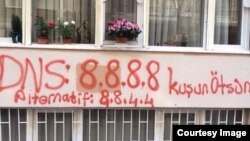The Turkish government’s attempt to block Twitter has largely backfired, analysts and social media watchers say.
Not even a day after Prime Minister Recep Tayyip Erdogan said the social media service would be “eradicated” from the country, Turks were still actively tweeting by the millions through a variety of workarounds.
A Turkish website, Zete.com, said 2.5 million tweets had been posted since the ban, reportedly setting traffic records in Turkey.
Twitter has a reported 10 million users in Turkey, and the popularity of the site has grown “rapidly during last summer’s Gezi Park protests with people using it to share views and receive information not reflected in the mainstream media with close business links to the authorities,” according to Amnesty International.
The hashtag #TwitterisblockedinTurkey was trending globally as free-speech supporters around the world voiced their concerns.
According to Doug Madory, an analyst with Renesys, an Internet intelligence company based in Manchester, New Hampshire, a Turkish activist contacted the firm requesting data on the blockage.
Renesys said there was Domain Name Service (DNS) poisoning “from some (not all) DNS servers in Turkey." DNS is a service that translates domain names into IP addresses.
DNS poisoning is used to block users from certain addresses. In essence it scrambles the numbers during the process of converting a website name into IP numbers, sending people to the wrong website.
Renesys said international DNS servers such as Google (8.8.8.8) did not seem to be impacted.
“This should be easily circumvented by Turkish users,” Renesys said.
The Google DNS address was reportedly spray painted on a building in Turkey.
Another method to circumvent the blockage has been to use Twitter’s SMS – mobile phone messaging - service.
Turks can also get around the blockage using a virtual private network or using Tor, a service which hides your location and browsing habits.
The Turkish telecommunications authority said access would be restored when Twitter removes "illegal content," referring to audio recordings that spread across social media which appeared to put Erdogan in the center of a corruption scandal.
European Union Enlargement Commissioner Stefan Fuele said Friday that being free to communicate and freely choosing the means of communication is a "fundamental EU value."
European Commission Vice President Neelie Kores criticized the Twitter ban as "groundless, pointless, cowardly."
“The decision to block Twitter is an unprecedented attack on internet freedom and freedom of expression in Turkey,” said Andrew Gardner, Amnesty International’s researcher on Turkey in a statement.
“The draconian measure, brought under Turkey’s restrictive internet law, shows the lengths the government is prepared to go to prevent anti-government criticism.” Kores said.
The White House is urging Turkey to restore access to Twitter.
White House spokesman Jay Carney told reporters that the U.S. has conveyed its "serious concern'' to the Turkish government.
The U.S. State Department also slammed the ban.
"An independent and unfettered media is an essential element of democratic, open societies, and crucial to ensuring official transparency and accountability,” a State Department statement said. “Democracies are strengthened by the diversity of public voices.”
Not even a day after Prime Minister Recep Tayyip Erdogan said the social media service would be “eradicated” from the country, Turks were still actively tweeting by the millions through a variety of workarounds.
A Turkish website, Zete.com, said 2.5 million tweets had been posted since the ban, reportedly setting traffic records in Turkey.
Twitter has a reported 10 million users in Turkey, and the popularity of the site has grown “rapidly during last summer’s Gezi Park protests with people using it to share views and receive information not reflected in the mainstream media with close business links to the authorities,” according to Amnesty International.
The hashtag #TwitterisblockedinTurkey was trending globally as free-speech supporters around the world voiced their concerns.
According to Doug Madory, an analyst with Renesys, an Internet intelligence company based in Manchester, New Hampshire, a Turkish activist contacted the firm requesting data on the blockage.
Renesys said there was Domain Name Service (DNS) poisoning “from some (not all) DNS servers in Turkey." DNS is a service that translates domain names into IP addresses.
DNS poisoning is used to block users from certain addresses. In essence it scrambles the numbers during the process of converting a website name into IP numbers, sending people to the wrong website.
Renesys said international DNS servers such as Google (8.8.8.8) did not seem to be impacted.
“This should be easily circumvented by Turkish users,” Renesys said.
The Google DNS address was reportedly spray painted on a building in Turkey.
Another method to circumvent the blockage has been to use Twitter’s SMS – mobile phone messaging - service.
Turks can also get around the blockage using a virtual private network or using Tor, a service which hides your location and browsing habits.
The Turkish telecommunications authority said access would be restored when Twitter removes "illegal content," referring to audio recordings that spread across social media which appeared to put Erdogan in the center of a corruption scandal.
European Union Enlargement Commissioner Stefan Fuele said Friday that being free to communicate and freely choosing the means of communication is a "fundamental EU value."
European Commission Vice President Neelie Kores criticized the Twitter ban as "groundless, pointless, cowardly."
“The decision to block Twitter is an unprecedented attack on internet freedom and freedom of expression in Turkey,” said Andrew Gardner, Amnesty International’s researcher on Turkey in a statement.
“The draconian measure, brought under Turkey’s restrictive internet law, shows the lengths the government is prepared to go to prevent anti-government criticism.” Kores said.
The White House is urging Turkey to restore access to Twitter.
White House spokesman Jay Carney told reporters that the U.S. has conveyed its "serious concern'' to the Turkish government.
The U.S. State Department also slammed the ban.
"An independent and unfettered media is an essential element of democratic, open societies, and crucial to ensuring official transparency and accountability,” a State Department statement said. “Democracies are strengthened by the diversity of public voices.”




